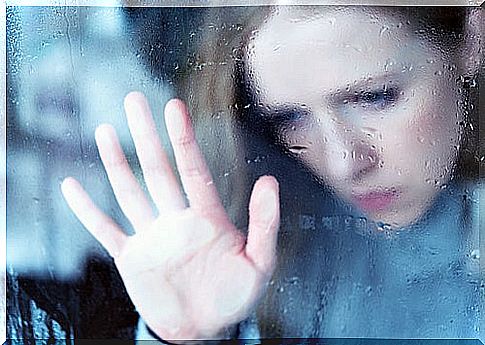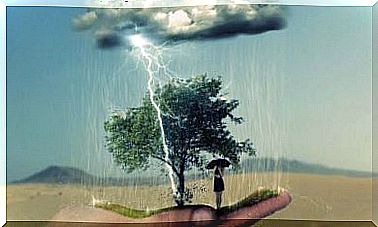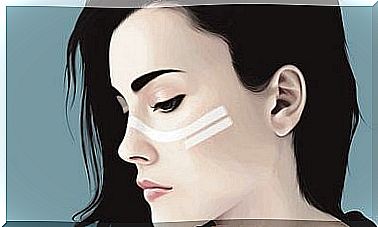The Shame, The Emotion That Does Not Stop Being

“What are they going to think of me if I really explain how I feel?” , “I hope you do not ask me, I would have a terrible time if I had to answer in front of everyone” or “I am unable to speak to a large audience, I get too nervous” are very common expressions of those who have shame as a life partner.
Avoiding standing out, fleeing from any moment in which attention can be drawn or rejecting invitations to comment or carry out certain activities are mechanisms developed by this emotion. Shame wants us to become invisible and for this, it is capable of putting a thousand and one strategies in motion. Now, what else is hidden behind this emotion? What is its background? Let’s go deeper.
The obstacle of shame
Shame is the enemy of visibility, of presence. It is a difficult emotion that appears to hide who we are because fear and insecurity have informed you that we will have a bad time.
According to the doctor in psychology Mª José Pubill, the person who experiences shame lives in fear of the fear that others will discover their weaknesses, which are none other than being themselves.

The origin of this emotion is usually found in an experience in which the person felt or was made to feel that it was not correct, that they did not behave as they should and that ultimately, their behavior was not normal. In this way, she was so marked by uselessness and disability that she avoids being imperfect at all costs or at least being considered that way by others. Her fear is so great that, at times, the block arises as a defense to protect her, while at the same time she plunges into a deep state of frustration at not becoming the person she wants to become.
Now, being ashamed implies, on the one hand, experiencing emotions such as guilt and fear and, on the other, mechanisms such as perfection and control to overcome the feeling of inadequacy. The problem is that beyond helping, they suppose the opposite: an obstacle when it comes to growing and evolving.
However, if we go a little further we will realize that shame implies a lack of respect and tolerance for oneself and ultimately a low self-esteem.
Shame and self-esteem: how are they related?
Shame is that fear of being, of showing what one is, of choosing to be invisible to avoid being the target of criticism and qualified as invalid. Therefore, experiencing this emotion implies a lack of respect and tolerance for oneself and therefore, a low self-esteem as a result of being in the background.
Shame envelops the person in a negative and self-deprecating filter, from which they perceive themselves as fragile and weak, while at the same time becoming angry about it.
Thus, being ashamed is not feeling comfortable in one’s own skin, it is not recognizing oneself and progressively going down the path of disconfirmation about what one is. In this way, little by little the initiative of being the captain who directs the helm of one’s life fades as well as the feeling of personal power.
Whoever experiences this emotion puts the value of himself in the hands of others because he is only capable of seeing himself through the eyes of others. He lives outside, thinking about what they will say, experiencing anxiety every time he perceives that it is not appropriate and disconnected from his interior. His stage is full of suffering and demand.

Put aside fears to make yourself visible
Although this emotion is considered one of the most complex, it is possible to work with it to reduce its prominence and make it disappear. Now how do you defeat shame? Rather, what to do to become visible, to value ourselves?
The first step begins by acknowledging and accepting that we feel shame, that is, that this emotion is part of our emotional universe. Once identified, the ideal is to reflect on its consequences, on the weight it has in our life and in what way it limits us, what prevents us from carrying out.
If we do it sincerely, we will discover that we have become invisible to our eyes and that we measure and value ourselves according to a scale established by others. The point is that there is no correct or adequate scale, but we establish it, as well as the steps and the path we want to travel.
The next step would be to decide to get to know us, connect with us and show ourselves as we are, that is, begin to be visible. Now, it will not be easy and more if we have been hidden for many years behind a character who behaved as expected by others. The good news is that it is never too late to give ourselves a chance and become our best friend.
Locating the situation from which it all began can also help us, since it will provide us with information about when we suffer and demand more of ourselves. In addition, this starting point will be key to understanding the depth of our wound, which is none other than the betrayal of oneself and the experience of believing that we have failed others.

A very powerful exercise to make ourselves visible is to stand in front of a mirror and observe ourselves without taking into account everything we think others think about us. What we see? As we are? What are our qualities? What does the person we are seeing need? The idea is to free ourselves from expectations, from those mental traps that prevent us from being ourselves and gaining security. We are not better or worse than anyone else and comparing ourselves is not the solution, but rather recognizing and feeling valid.
In some cases we may carry feelings of anger towards the person who at first reproached us that we did not do it well. To free it, we can write or simply think about what we would say to that person. In this way, we will contact the burden of experiencing shame and then release it.
As we can see, being ashamed means much more than having a bad time at a certain moment. This emotion induces us to be slaves of the expectations of others, to despise ourselves and ultimately, to be invisible. Hence, learning to connect with us to get to know ourselves and value ourselves is essential to gain security and bear in mind that it is not a question of being perfect but of integrity to savor well-being.









